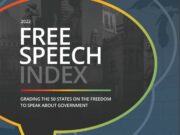CCP Founder and Former Chair of the Federal Election Commission Bradley Smith has penned a fascinating review of Ohio State University Associate Professor Paula Baker’s book, “Curbing Campaign Cash” for the Library of Law & Liberty. Entitled The Campaign Finance Merry-Go-Round, Smith’s piece deconstructs the focus of Baker’s book, namely the race between Henry Ford and Truman Newberry for Senate in 1918, and the repercussions the race has had on the current campaign finance debate.
Smith tells us exactly where Baker is heading when he says her approach is not “a morality tale of honest government corrupted by big money, but rather as a cautionary story about big government regulation of honest money and the political choices of the electorate.” Newberry would defeat Ford, but would pay dearly for his win as Ford (and men with powerful ties to the Woodrow Wilson administration) would prosecute Newberry in the court of public opinion and, later, in an actual trial, alleging corruption and inferring abuse of the system caused by Newberry’s ability to raise and spend money on his campaign. As the trail Judge Clarence Sessions said at the time, “the very life of the Nation is threatened” by the “filth and poison” of campaign spending.
Unfortunately, as Brad notes, this kind of hysteria surrounding spending in campaigns has never dissipated:
To anyone who has followed the campaign finance saga of the last two decades, the story has a remarkable sense of familiarity to it. In the partisan campaign and abuse of prosecutorial power to unseat Newberry (“a political job, from beginning to end” said Michigan’s senior Senator, Charles Townsend), newspaper editorials were referenced as fact, self-serving statements by opposition politicians held forth as evidence of wisdom from those who understood the alleged dangers best, and naked abuses of government power praised by sanctimonious advocates of “good government. ” “Reformers” were themselves prepared to cut most any corner and to unfairly smear any reputation if it helped to obtain the political goal of “good government” reform. And always, the debate was conducted in high dudgeon: “rhetorical ambitions soared far higher than the record before them,” notes Baker.
Indeed, the furor surrounding the recent Presidential election as the most expensive in history, coupled with the public outcry over “dark money” and “corporations as people” is the ideological great-grandchild of the public campaign to destroy Newberry. As Brad writes:
Indeed, today one of the most frustrating things about the campaign finance debate remains the sheer demagoguery of the issue, starting at the very top. For example, during his 2010 State of the Union address, President Obama famously upbraided the Supreme Court for its recent decision in Citizens United v. Federal Election Commission, saying
“Last week, the Supreme Court reversed a century of law to open the floodgates for special interests — including foreign companies — to spend without limit in our elections. Well, I don’t think American elections should be bankrolled by America’s most powerful interests, and worse, by foreign entities. They should be decided by the American people, and that’s why I’m urging Democrats and Republicans to pass a bill that helps to right this wrong.”
Yet every assertion in the statement is factually incorrect – the decision did not reverse a century of law, it did not allow foreign companies or foreign entities to spend any money in U.S. campaigns, and it did not allow anyone but the American citizens to decide American elections.
It seems the worry over the corrupting influence of money in elections has been with us for quite a while — and doesn’t appear to be leaving us any time soon as super PACs and non-profit groups continue to gain strength as fund raising entities on behalf of issues and candidates. But, as Brad points out, the reality is that Newberry may have been elected — and punished for it in the aftermath — for nothing more than simply being the candidate that appealed to more voters:
Of course, whether the public was ill-served by the election of Newberry is a different question altogether. Michigan voters were fully aware by election day of the campaign’s record spending. Meanwhile, though his engineering and business achievements are incontestable, in matters of public affairs Ford was more the empty suit than Newberry. He was ignorant of history (he testified to the Senate that the American Revolution happened in 1812, and that Benedict Arnold was a writer) and government (when first approached about running by a Wilson confidante, he asked, “What does a Senator have to do?”). He believed that Newberry’s campaign had been financed by “a gang of Jews” as part of “a conspiracy to control the Senate.” (Much as today’s “reformers” run a nativist campaign against Citizens United based on unsupported claims of “foreign money.”) Perhaps, given the information provided by the campaign, the public really did think that the sober, sincere Newberry was a better choice. Or perhaps they actually did oppose the League of Nations.
A truth we, as we find ourselves navigating a ubiquitous, and sometimes painfully partisan news cycle, would do well to remember. It does a disservice to suggest that voters are only influenced by money. For better or worse, sometimes all the money in the world cannot stop them from voting their conscience. Something this last presidential election surely taught us.














